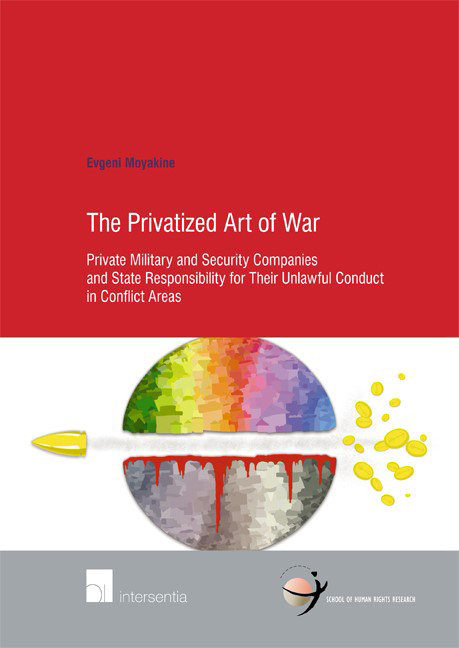 The Privatized Art of War
The Privatized Art of War Book contents
- Frontmatter
- Dedication
- Acknowledgments
- Contents
- List of Abbreviations
- Chapter I General Introduction
- Chapter II Privatization of War and Security – War is Business and Vice Versa
- Chapter III Existing Legal Framework of PMSC Operation
- Chapter IV Legal Status of PMSC Employees
- Chapter V State Responsibility under the Draft Articles on State Responsibility
- Chapter VI State Responsibility for Non-Compliance with Positive International Law Obligations
- Chapter VII Summary, Overall Conclusions, and Final Observations
- Dutch Summary — Nederlandse Samenvatting
- Russian Summary — KPATKOE COДEPЖAHИE KHИГИ HA PУCCKOM ЯэЬІKE
- Selected Bibliography
- Table of Cases
- Selected United Nations Documents
- Index
- Curriculum Vitae
- School of Human Rights Research Series
Chapter V - State Responsibility under the Draft Articles on State Responsibility
Published online by Cambridge University Press: 28 November 2017
- Frontmatter
- Dedication
- Acknowledgments
- Contents
- List of Abbreviations
- Chapter I General Introduction
- Chapter II Privatization of War and Security – War is Business and Vice Versa
- Chapter III Existing Legal Framework of PMSC Operation
- Chapter IV Legal Status of PMSC Employees
- Chapter V State Responsibility under the Draft Articles on State Responsibility
- Chapter VI State Responsibility for Non-Compliance with Positive International Law Obligations
- Chapter VII Summary, Overall Conclusions, and Final Observations
- Dutch Summary — Nederlandse Samenvatting
- Russian Summary — KPATKOE COДEPЖAHИE KHИГИ HA PУCCKOM ЯэЬІKE
- Selected Bibliography
- Table of Cases
- Selected United Nations Documents
- Index
- Curriculum Vitae
- School of Human Rights Research Series
Summary
You cannot escape the responsibility of tomorrow by evading it today.
Abraham LincolnINTRODUCTION
As was explored in the previous Chapters, nowadays the phenomenon of privatization of war and security forms the core subject of numerous debates in academic circles, while the whole industry of PMSCs shows clear signs of extensive growth and expansion. Various States and even non-State entities, such as international organizations and corporations, more frequently rely on a wide array of military and security services provided by private companies, challenging international and transnational legal frameworks. It has been established that these companies often seem to operate in practice and de jure in a “legal vacuum”. Their employees potentially can and on many occasions do engage in the commission of international crimes and breach international humanitarian and human rights law without being prosecuted, while hiring States can avoid any form of responsibility by pointing out the absence of formal connections to the actual perpetrators of the crimes. Also, home and host States other than those employing PMSCs are not held responsible and remain at a considerable distance from what happens in the reality of deployment of private contractors by being physically removed from the actual situation on the ground or being unable or unwilling to get involved. Using this strategy of hiring private contractors in conflict-affected zones, States can escape international responsibility not only by successfully bypassing international humanitarian law, but also breaching human rights and fundamental freedoms without consequences.
While there is still a spectrum of unsolved issues and uncertainties to be discovered regarding the responsibility of States for such acts and omissions, the body of contemporary international law is not irrelevant and can be used to incur international responsibility. As was pointed out above, domestic legal orders and transnational pri-vate regulatory frameworks are not able to coherently address instances of misconduct of PMSCs and their employees violating international law. Currently, the focus needs to shift to the responsibilities of States and the role of hiring, host, and home States as entities capable of guaranteeing respect for human rights and international humanitarian law. Although there is no extensive framework on the international responsibility of non-State actors, such as PMSCs and terrorists, customary rules and principles on the responsibility of States have been crystallized into a system that is clearer and more coherent due to the efforts of a number of International Law Commission's Special Rapporteurs.
- Type
- Chapter
- Information
- The Privatized Art of WarPrivate Military and Security Companies and State Responsibility for Their Unlawful Conduct in Conflict Areas, pp. 201 - 302Publisher: IntersentiaPrint publication year: 2015
